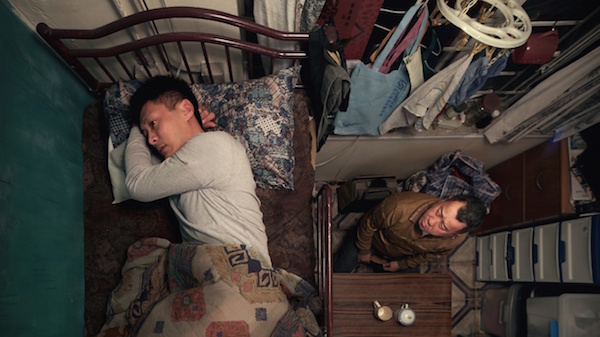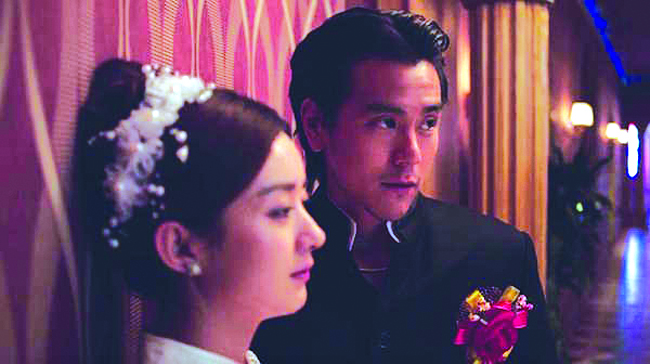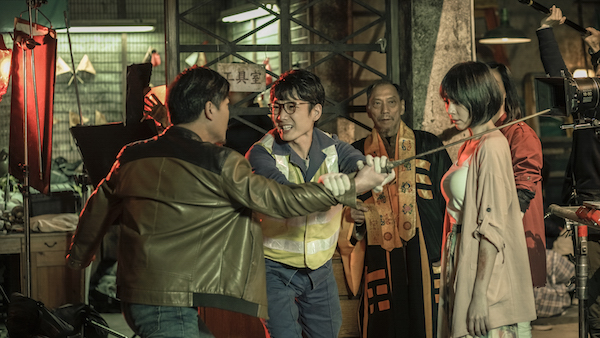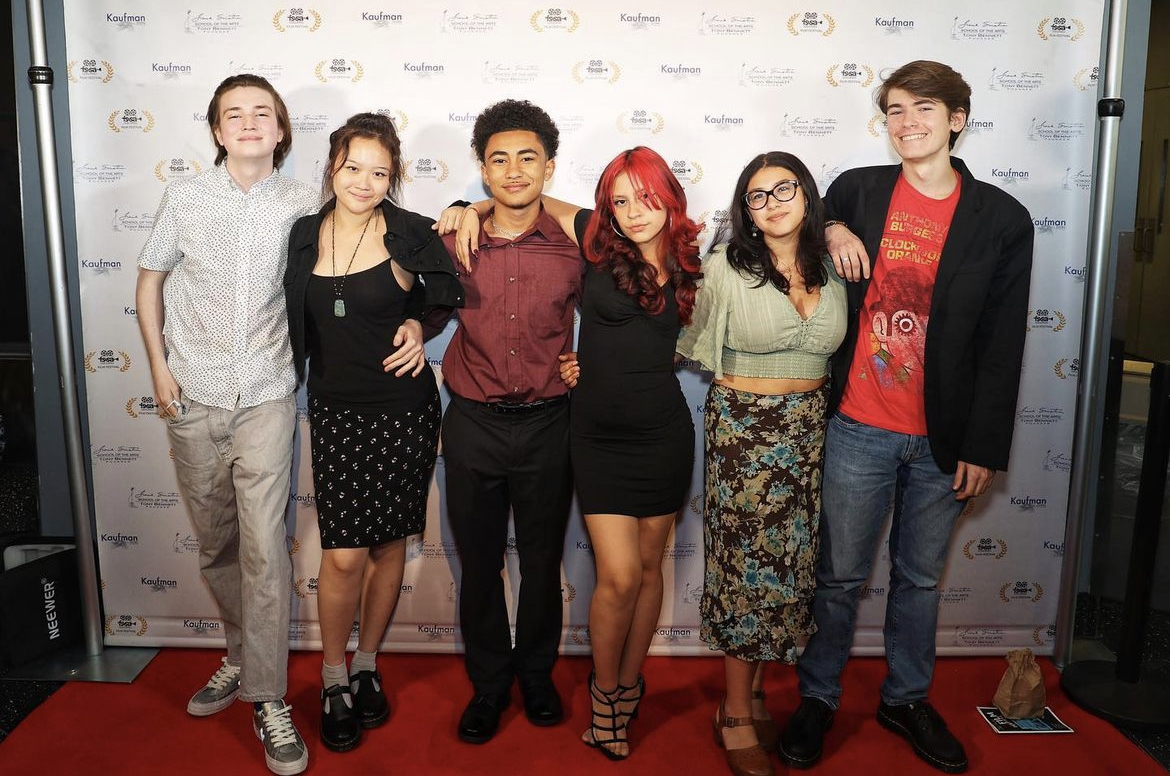
BY SCOTT STIFFLER | Bullets fly and swords are wielded in plenty of the crowd-pleasing, kinetic selections at 2017’s New York Asian Film Festival — but its deepest cuts come from the sharp tongues of those who know us best. Uneasy questions and murky answers about what makes, breaks, and heals a family are front and center in a number of outstanding selections this year, the first of which possesses numerous strengths independent of the queer content that garnered accolades after screenings in Berlin and its native Japan.
Pining for a parent with nurturing instincts is the day-to-day routine of 11-year-old Tomo, a sullen latchkey kid beginning to wrestle with her own complicity in acts of petty prejudice inflicted upon a friendless classmate and a new ally from the adult world. Stung once again by a mother who responds to the pressures of single parenthood by giving herself to booze, men, and long periods of absence, Tomo arrives at the workplace of Uncle Makio, who takes her in — with a word of caution before they arrive at his door. Makio now resides with Rinko, a transgender woman with intriguingly firm breasts, a yearning for domestic bliss, and a maternal sense of how to pass along her use of needles and yarn as a purification system for toxic emotions (hence the means-what-it-says title: “Close-Knit”).
Corners, closets, benches, and walls get a thorough workout as artfully framed go-to places of retreat and resolve in this latest entry from Naoko Ogigami, a writer and director whose comedic body of work has long placed her female characters in unfamiliar environments. This time, however, the strangers in a strange land aren’t tasked with running a new business in Helsinki (2006’s “Kamome Diner”) or plopped down on an island full of eccentrics (2007’s “Glasses”) — they’re beside us at school, in supermarket aisles, and at the dinner table, which makes the resulting culture clashes more sinister than quirky.
Rinko, still negotiating her romantic relationship as well as a lingering connection to a certain part of the male anatomy, suffers the most from this disparity. Effectively underplayed by pretty boy hetero heartthrob Toma Ikuta, audiences accustomed to a steady diet of transgender characters presented as outlandishly sassy, highly sexualized, or damaged beyond repair will be tempted to interpret frumpily dressed Rinko’s stoicism as a weakness — but the character’s restraint in the face of multiple indignities, and her glacial progress at bonding with Tomo, has a cleverly orchestrated effect on the impatient viewer: mounting outrage at how those with obvious differences are pushed to the margins, when they have every right to equal footing.
During her early days of cohabitation with the couple, Rinko’s mother takes Tomo out to a restaurant and lets her know, with gangster-like intimidation, that nobody messes with her daughter. (Note: every time she refers to her child in the feminine sense, quote marks are absent from both subtitle and tone of delivery.) Sadly, this seemingly enlightened cisgender woman — who proudly recalls buying pre-teen Rinko a bra — delivers the film’s most hurtful comment, made all the more brutal because she believes it to be a declaration of support.
The film is swimming in such moments, where cutting observations and powerful declaratives are intertwined, such as when, in the flip side of that restaurant scene, Uncle Makio (Kenta Kiritani) tells his niece the why, when, and how of falling in unconditional love with Rinko. Tomo (Rinka Kakihara) also takes a stand for something far beyond mere tolerance by visiting the gay classmate she once snubbed, determined to validate his worth and push him toward self-acceptance.
Guard down and chin up seems to be the best any given character in “Close-Knit” can offer to another or muster for themselves. Screenwriter Ogigami’s words, soft as yarn but tightly wound, make a convincing case that decency and determination are the only virtues powerful enough to move us forward. Sat., July 8, 8pm (Q&A with the director follows the screening).Japanese with English subtitles. 127 minutes.
Elsewhere in the festival, “Mad World” refers to the inhospitable zone beyond the psychiatric rehabilitation facility that discharges former investment banker Tung (Shawn Yue), one year after a breakdown triggered by his stint as abused caretaker to his late mother. The transition is further complicated by his new roommate: the father whose abandonment contributed to his current mental state. Eric Tsang co-stars as the surviving parent, and will attend the film’s July 12 screening for a Q&A alongside director Wong Chun and screenwriter Florence Chan (Tsang also receives the festival’s 2017 Star Hong Kong Lifetime Achievement Award).

On July 9, “Someone to Talk To” finds two couples at a government registration office; one filing for marriage, the other for divorce. Ten years later, their love/hate status has shifted — and the older sister of husband Aiguo (Mao Hai) announces her determination to marry. Tisch School of the Arts graduate Liu Yulin’s debut feature has its own connection to family: a screenplay written by her father, Liu Zhenyun, based on his 2008 novel, “One Sentence Is Ten Thousand Sentences.”
Drawing from the deep well of fiction that tell us you can only go home again by getting knocked on the noggin, lapsing into a coma, and learning a valuable lesson, “Duckweed” does its “Wizard of Oz” quest thing very well, but also manages to spread a thick layer of subversive melancholy atop the save-my-parents/save-myself prime directive of “Back to the Future.” The result is an often light but consistently challenging rumination on destiny that refuses to shave the bittersweet edges off its arrogant antihero’s bid for redemption.
It’s 2022, and gifted rally driver Tailang (Deng Chao) caps his victory with a venomous and very public criticism of Zhengtai (Eddie Peng), the father who refused to support his dreams. In a slow-motion crash sequence as bold as the rest of the film is restrained, Tailang’s car meets the business end of a speeding train and he wakes up back in 1998, the year before he was born. Rather than concern itself with the mechanics of time travel that made this possible, “Duckweed” gets right down to the serious business of ambition, interpersonal dynamics, and fatal flaws — groundwork that’s nicely established in a scene where Tailang is rescued from a skirmish by his shockingly spry and charismatic father, an entrepreneurial gang leader with terrible business instincts and the wrong taste in women. It seems Zhengtai has a fiancé whose maiden name is not that of the mother who must give birth before dad is sent to prison for six years, only to emerge as the twisted tormenter responsible for turning his now-motherless boy into the ungrateful heel of 2022. For the tail end of the ’90s, though, the trio become fast friends while the Tailang goes all out to ensure his very existence.

What makes “Duckweed” so engaging has very little to do with how the future version of an unborn son maneuvers the right people to the altar. That’s enjoyable enough, yes; but its real appeal is rooted in the slight advantage director Han Han gives the audience over the main character. We’re always one step ahead when it comes to realizing that despite Tailang’s knowledge of impending events and his slowly emerging sense of empathy, some lives will be lost and others will be damaged; perhaps beyond repair.
Waking up in the present to find his timeworn father at the hospital bedside, a tender moment of recognition between them provides a bit of hope, but stops short of delivering the brand of dewy kinship that made Dorothy Gale and Marty McFly’s homecoming such a pleasure to watch. That narrative choice is difficult to digest, but it sure does stick to the ribs. Sat., July 15, 12:30pm. Mandarin with English subtitles. 101 minutes.
An anomaly relative to the more somber entries in this roundup, “Vampire Cleanup Department” never drops the ball in its desire to juggle gore and genealogy. Like the kindhearted teen whose newfound immunity to supernatural toxins gives him an edge in the fight against evil, “VCD” is a zippy hybrid with an unusual blood type coursing through the veins of its franchise-friendly mythology: Deep beneath a seemingly mundane garbage collection station, civil servants who sweep the streets by day spend their nights answering the call to keep Hong Kong’s robust population of undead in check.
“When a person dies with injustice on a cloudy day, at a gloomy place, then he might turn into a vampire,” says Uncle Chung (a droll Richard Ng), who recruits naive and nerdy Tim (an appropriately named Babyjohn Choi) into the team’s rapidly aging ranks after a vampire attack reveals his nephew has inherited protective powers from his late mother (mom and pop, turns out, were Department bigwigs who died heroically). Trained in the ways of vampire fighting and soul reclamation, the dutiful but untested teen is sworn to secrecy (having refused a sip of memory-erasing tea that keeps the general public blissfully unaware).
On his first mission, Tim comes fresh-face-to-putrefied-face with a female vampire. Lacking the heart to stab hers, a bloody good smooch turns Summer (Lin Min-chen) into a mute but perceptive beauty. The rest of the film plays out as a manic series of seismic shifts in tone, with Tim hiding his new love interest from the others, coaching her in the ways of humanity, and confronting threats on several fronts (a big bad vampire; a delusional grandmother; the upstart local authority determined to replace VCD with his own force). Transfused with injections of comedy, action, horror, and romance, directing team Chiu Sin-hang and Yan Pak-wing are so dead-set on entertaining you that the genre-hopping attention deficit disorder of their debut feature proves less of a distraction than a welcome asset. Sat., July 15, 10pm. Cantonese with English subtitles. 94 minutes.
The New York Asian Film Festival runs through July 13 at The Film Society of Lincoln Center (165 W. 65th St., btw. Broadway & Amsterdam Ave.) and July 14-16 at the SVA Theatre (333 W. 23rd St., btw. Eighth & Ninth Aves.). For tickets ($14; $11 students/seniors), visit subwaycinema.com.


















